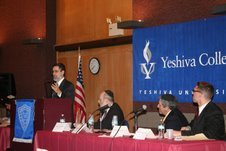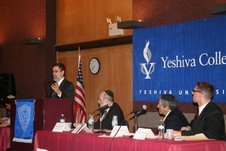A kosher quandary: panel discusses ethics and kashrut
By Michael Orbach
Issue of Dec. 19, 2008
The Orthodox community’s response to alleged legal and ethical breaches at the Rubashkin meatpacking plant came under scrutiny by community and kashrut industry leaders who spoke last week as part of a panel discussion entitled “Kosher Quandary: Ethics and Kashruth.”
The Dec. 9 event at Yeshiva University was organized by a new student group, whose acronym, TEIQU (Torah Exploration of Ideas, Questions and Understandings) mirrored the convoluted nature of the answers.
The four panelists, representing the major threads of orthodoxy, analyzed the relationship between kashrut and ethics in a public forum for the first time.
The panelists were Rabbi Avi Shafran, director of Public Affairs for Agudath Israel; Rabbi Menachem Genack, rabbinic administrator and CEO of the Orthodox Union’s (OU) Kashrut Division; Rabbi Basil Herring, executive director of the Rabbinical Council of America; and Shmuly Yanklowitz, co-founder and director of Uri L’Tzedek, a grassroots Orthodox social justice movement. As the panel moved from right to left, both literally and religiously, from Shafran’s lengthy beard, past Herring’s modestly trimmed combination, to Yanklowitz’s five o’clock shadow, the answers alternated from a distinct no to a resounding yes.
After a brief introduction by YU President Richard Joel (“I thought there’d be food. You can’t find food on this campus without paying anymore”; perhaps the best line of the evening from a YU perp in the crowd: “that’s the quandary!”), each panelist was given eight minutes to answer three questions probing the connection between kashrut and ethics and whether outside circumstances, like the ones in Rubashkin, can jeopardize a kosher certification.
In the case of Rubashkin, a federal raid netted close to 400 illegal immigrants, some of whom, according to an indictment by the Iowa Attorney General, were underpaid, underage and forced to work long hours in an unsafe working environment. The mood of the crowd at Tuesday night’s panel, over 500 that overflowed around the auditorium, was subdued and respectful.
Shafran, who spoke first, made the comparison that kashrut to ethics is like personal hygiene to poetry.
“A great poet might opt to not shower, but that bad habit does not necessarily affect the quality of his writing,” Shafran said, prefacing that his remarks and beliefs may “prove not as popular as those after me.” He also described Hekhsher Tzedek, the conservative effort to provide ethical supervision to food producers intended to work in tandem with other kosher certifications, as being conceived in “sin,” specifically that of “jumping to negative judgments.”
“I don’t know what Rubashkin did,” Shafran gravely told a quiet audience. “What I do know is it is Jewishly wrong to assume guilt on accusations. It is, to put it clearly and simply, unethical.”
The question of Rubashkin, according to Shafran, should have been delegated to the elders of the Jewish community, a difference that typified the reaction between the Orthodox and the Conservative response.
“I don’t expect a Conservative Rabbi to acknowledge that fact: non-Orthodox rabbis are based on progression, not on Mesorah and not on respect for elders. But those of us who call ourselves Orthodox have to know on whose shoulders we stand,” Shafran asserted to a relatively modest applause.
Genack, who sat to Shafran’s left, offered a more moderate tone. While his views coincided with Shafran’s about the nature of kashrut and that Agriprocessors, the Rubashkin slaughterhouse, was strictly kosher, his complaint against the plant was the perception of kosher in the Jewish world.
“The erosion of people’s perception of kosher almost willy-nilly will affect their identity as Jews,” Genack said, speaking of his own experience growing up where kosher was equated to being Jewish. If nothing else, Genack explained, Rubashkin has changed the way people viewed kosher.
He disavowed criticism of the OU’s handling of Rubashkin and stressed that examining plants and worker conditions is the government’s responsibility and not in the scope for a Jewish organization, especially the OU which supervises over 8,000 plants. When criminal charges were filed against Rubashkin, the OU threatened to withdraw its certification unless new management was appointed. Bernard Feldman, Rubashkin’s longtime lawyer from Long Island, was appointed as the new CEO in September.
Genack, unlike Shafran, lauded the work of the Hekhsher Tzedek.
“The initiative itself I think is meant on their part to try to bring their own constituency back to kosher,” Genack said.
Herring noted that his views had already been said.
“The ultimate goal and purpose of intellectual perfection is ethical behavior and we cannot forget that,” Herring explained.
The RCA, which is not connected to kashrut, has said that it will publish its own guide to ethical behavior regarding business industry and specifically the food producing sector. Herring also decried any large-scale ban on “what might in the end, be an innocent party,” which may allude to the ban initiated by Uri L’Tzedek on Rubashkin meat this past May.
Yanklowitz, a good 20 years younger than his peers on the panel, and the only one of the four that visited Postville, where the plant is located, offered the harshest condemnation of Rubashkin. In an intense exhortation that bordered on prophetic outrage, he spoke of a girl named Maria, who was mistreated at the Rubashkin plant and was then detained by federal authorities.
“Where is our moral courage?” He repeatedly asked, before comparing the conditions of Rubashkin to ancient Egypt.
“Halacha is the floor, not the ceiling,” Yanklowitz said to applause and even some hoots. “Focusing exclusively on kashrut and not paying attention to ethics makes halakha morally irrelevant, chas v’shalom.”
Yanklowitz then described in detail Uri L’Tzedek’s next initiative, Tav Vayosher, that aims to provide ethical seals to kosher restaurants in New York City insuring that workers rights are not violated.
Later in a series of questions posed by the moderators, Genack defended Rubashkin and said he felt that there was a bias against them. “I think fundamentally they are good people,” he said, but admitted, “they broke the law, and there are consequences for breaking the law.” Regarding the treatment of the workers, even President Bush wasn’t immune to criticism from the mild-mannered Genack. “Of course, you can count on the Bush administration to screw things up,” he said.
In a tell-tale sign about the feeling of the debate, the statement that received the greatest amount of applause came from one of the moderators, Simcha Gross, co-founder of TEIQU, who questioned Genack’s dependence on secular laws.
“Isn’t there a philosophical problem here when secular society sets the ethical standard for the Torah community?” Gross asked. “For example, U.S. law defines pornography one way and we define tznius in a very different another way. We don’t establish our school and shul dress codes based on U.S. laws so why should we define our business standards of social justice on U.S. law?”

 41.0°,
Fair
41.0°,
Fair 







